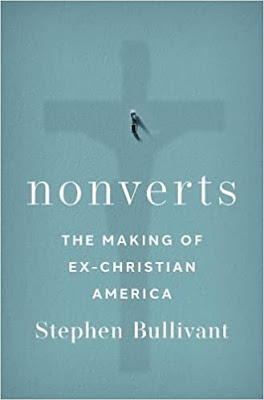For example, according to Stephen Bullivant's data in Nonverts: The Making of Ex-Christian America, only one in three of the Nones are atheists or agnostics. Which means most Nones believe in God or something akin to an impersonal Higher Power.
But as we've learned from Bullivant, there are two kinds of Nones, the Cradle Nones and the Nonverts, Nones who were raised without a religion versus Nones who have left a religion. And these two groups are different in the degree to which they believe in God. For example, where only 14% of Cradle Nones are convinced of God's existence, that number is 22% among the Nonverts. When it comes to believing in a non-personal Higher Power, 35% of Nonverts are believers to only 22% of the Cradle Nones. In short, Nonverts might have left church but they remain haunted by God.
Beyond the question of a personal God or an impersonal Higher Power, the Nones also affirm a bunch of religious and spiritual beliefs. As Bullivant, observes, "good proportions of even (the more skeptical) cradle nones are quite comfortable believing in life after death, heaven, hell, religious miracles, or the supernatural powers of their forebears. Indeed, an eclectic, pick-and-mix approach to the supernatural is frequently a hallmark of the 'spiritual but not religious'."
For readers of Hunting Magic Eels, this should be familiar territory as I deal, in Part 4 of the book, with this eclectic, pick-and-mix approach to the supernatural among the spiritual but not religious.
As Bullivant notes, sociologists have begun describing this growing "spiritual but not religious" crowd as "liminal nones." Liminal means to be "on a threshold," standing in an "in-between place." Most Nones, and most Nonverts, are Liminal Nones, they are not hard-core atheists. Most Nones live in the space between belief and skepticism, between faith and doubt. In the language of of Hunting Magic Eels, most Nones remain enchanted to some degree or another.
This is an important point for churches who are trying to address deconversion or reach out to the Nonverts. I have no systematic data here, but my sense is that the pastoral class in churches tend to assume that atheism is the challenge. Not so! So let me say it clearly: The New Atheists are not your problem. The Nones are not atheists. The Nones are supernaturalists. Consequently, as I argue in Hunting Magic Eels, and even more so in the upcoming paperback edition with a new chapter entitled "Hexing the Taliban," the church needs to think less about atheism than about paganism, witchcraft, and other assorted metaphysical beliefs from karma to astrology to Tarot to crystals.


